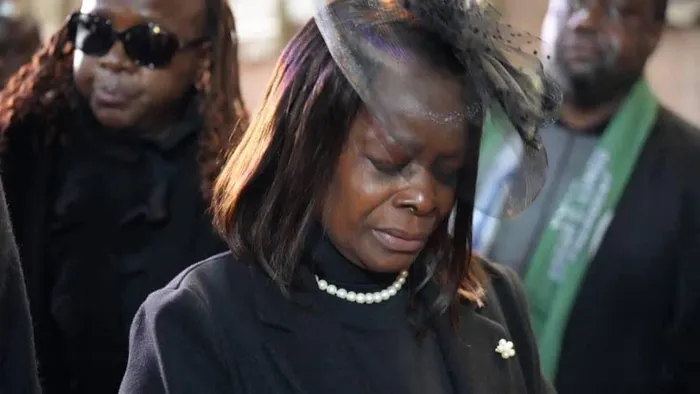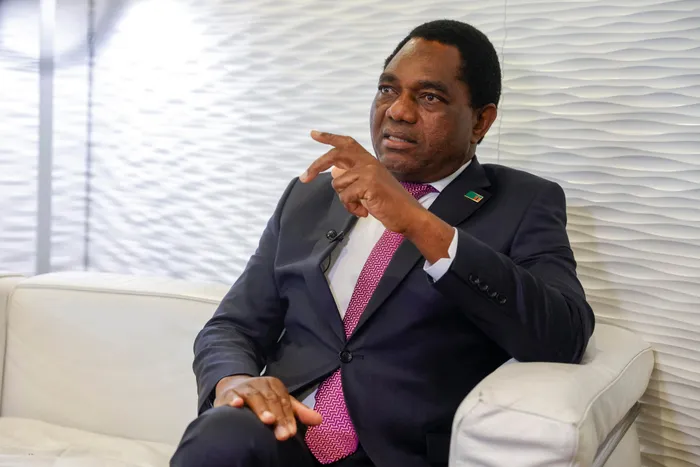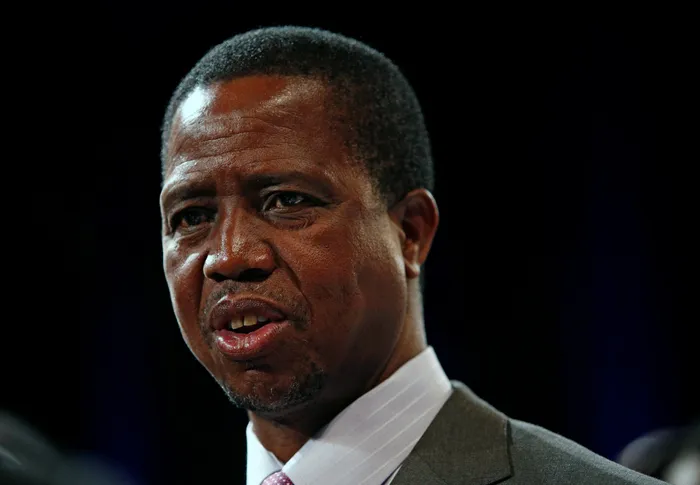The death of a former Zambian president: diplomacy, grief and ubuntu

Esther Lungu, former president Edgar Lungu's wife, is grappling with grief and unanswered questions after his death.
Image: Supplied
Sifiso Sonjica
The passing of a former head of state is invariably a profound and reflective moment for any nation. In Zambia, a country with a proud legacy of democratic governance, cultural reverence for elders and strong communal values, the death of a past president initiates a period of mourning, national reflection, and often, political reconciliation.
Yet, as evidenced by the complex and contested death and burial of former President Edgar Chagwa Lungu, such events also carry deep diplomatic, legal, and emotional implications. They unveil fault lines within the state, raise questions about family rights, and underscore the challenges of balancing state authority with the wishes of grieving relatives.
Importantly, these events remind us of the African philosophy of Ubuntu, which emphasizes our shared humanity and moral obligation to care for one another. In light of this, I found it worthwhile reflecting on the events surrounding Edgar Lungu's death and burial, the diplomatic entanglements that followed, the grief endured by his family, and the lessons that the African continent can draw through the lens of Ubuntu.

Zambian President Hakainde Hichilema. The Zambian government is trying to force the repatriation of former president Edgar Lungu's body.
Image: AFP
The death and the diplomacy around It
Lungu, who was Zambia's sixth president from 2015 until 2021, died on June 5, 2025, at a hospital in Pretoria. He was receiving treatment for a rare esophageal condition when complications from surgery resulted in his death. In response, the Zambian government declared a seven-day period of national mourning, which was later extended by an additional nine days. Flags were lowered to half-mast, and a state funeral was planned in Lusaka, in line with national customs and protocols for former presidents.
However, what was intended to be a respectful and unifying national homage quickly turned into a diplomatic dispute. A private family service was scheduled in Johannesburg, but the Pretoria High Court, acting on a request from the Zambian Attorney General, stopped the burial, asserting that Lungu, as a former head of state, was both legally and symbolically a representative of the Zambian nation and therefore deserved a state burial in his homeland.
South African officials, caught between honoring the family's wishes and maintaining diplomatic decorum, expressed regret over the situation while advocating for a solution that would respect the deceased's dignity. This unforeseen international legal conflict created a complex diplomatic challenge, turning what should have been a sacred and solemn event into a politically charged and widely publicised confrontation.

Zambian President Edgar Lungu.
Image: Rogan Ward/Reuters
Burial standoff: State versus family
At the heart of this controversy was a tense standoff between the Zambian government and the family of the deceased president. The authorities were adamant about bringing Lungu’s remains back for interment at Embassy Park, the official burial site for national leaders in Lusaka, citing both national customs and constitutional precedent.
They maintained that a state funeral was not merely a formality but an essential expression of national identity and respect.
In contrast, Lungu’s family asserted that he had specifically requested that President Hakainde Hichilema not attend his funeral, due to unresolved issues and allegations of persecution after his presidency. They also criticized the government's approach, arguing that the personal wishes of the deceased and the emotional needs of the family were being overshadowed by political symbolism.
On June 18, the family obstructed the repatriation of his body, alleging a violation of their agreement. The next day, President Hichilema declared the official end of national mourning, stating that it was no longer practical to indefinitely delay the funeral arrangements. Subsequently, on June 20, the family made the unprecedented choice to privately inter Lungu in South Africa, marking him as the first former Zambian president to be buried outside the nation.
However, on June 25, the High Court intervened once more, suspending the burial until a final decision on jurisdiction could be made on August 4. This ongoing standoff highlights a complex conflict involving national identity, personal legacy, family grief, and legal jurisdiction. It evolved into more than just a burial; it became a confrontation between constitutional formalities and deeply personal mourning.
Diplomatic undercurrents
This unusual incident has also put a strain on the diplomatic ties between Zambia and South Africa. The Minister of International Relations and Cooperation expressed support for the family's desires but remarked that a state funeral in Zambia would be "most appropriate" for someone of Lungu's stature. Pretoria's repeated legal interventions highlighted the complexities involved in hosting a former foreign head of state and emphasized the necessity of adhering to international norms and cross-border legal frameworks.
President Hichilema formally apologised to the South African government, describing the situation as "diplomatic embarrassment". His apology recognized that internal conflicts - stemming from Zambia's unresolved political tensions - had spilled over into the regional sphere, disrupting diplomatic decorum and potentially harming Zambia's reputation as a model for peaceful political transitions.
This situation highlights the urgent need for African nations to establis hprotocols that balance state responsibilities with the sensitivities of grieving families, particularly in cases involving prominent national figures whose legacies elicit mixed public reactions.
Family’s pain and public grief
In the aftermath of his passing, the Lungu family has been engulfed in grief, exacerbated by public attention, legal challenges, and political unrest. They have faced intense media scrutiny, public discussions, and legal orders that have repeatedly interrupted their mourning. Most poignantly, reports have surfaced indicating that some family members have encountered travel bans and pressure from various political figures.
Makibi Zulu, a family representative, poignantly remarked, “Perhaps this time, Edgar has refused to be laid to rest without the truth being revealed.” This sentiment captures the family’s view that Lungu’s death has become a disputed story, highlighting deeper issues within Zambia’s political landscape.
Unverified claims of poisoning and systemic harassment have further politicised his death, complicating the family’s quest for closure. As they navigate both personal loss and public controversy, the Lungu family’s suffering underscores the challenge of disentangling the personal from the political in the life - and death - of a public figure. Their sorrow has become a symbol of a wider national discomfort, as citizens grapple with how to honour leadership in a time of divided memories.
Ubuntu and pathways to healing
The African concept of Ubuntu, often translated as “I am because we are,” provides a vital framework for how such national moments can be approached with compassion, dignity, and unity.
Ubuntu calls for empathy, shared humanity, and communal responsibility - values that are indispensable in moments of grief and division. As such, African societies must prioritize empathy over politics when national figures pass. Grieving families deserve support and space to mourn. This principle applies regardless of one’s political alignment or opinions of the deceased’s legacy.
More so, the death or burial of a leader should not inflame tensions. Elders, traditional leaders, and mediators must facilitate respectful dialogue between state officials and families to avoid conflict and ensure dignity for all parties. This is important in balancing state honour with family customs.
Most importantly, I am of the view that African Union and SADC should consider formal protocols for cross-border funerals of former leaders to prevent similar disputes and ensure that such events foster unity rather than discord.
Toward collective healing
The disputed passing of Edgar Lungu highlight the persistent difficulties African communities encounter in balancing political changes, familial mourning, and national identity. Although the immediate circumstances have led to diplomatic tensions and emotional distress, they also present a vital chance for introspection and development.
Through the concept of Ubuntu, Africans are reminded that our shared humanity should unite us, even in death. The legacy of a former leader, no matter how debated, should be treated with humility, empathy, and a dedication to collective dignity. The continent must learn to honor its history, not just through rituals or legal means, but through sincere efforts to promote healing.
In light of the above, I suggest that we must consider: How can we ensure that all leaders, irrespective of their political stance, are commemorated in a manner that honours both the state and the spirit? And how can we transform moments of national mourning into opportunities for unity rather than division? By addressing these questions with hearts guided by Ubuntu, we might transform national sorrow into continental wisdom and discover in grief the seeds of solidarity.
- Sonjica is an ANC member in Ward 13 of Mtubatuba in KZN. He writes in my personal capacity.